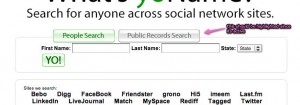13.4 Public Records about Individuals
Let’s look at some of the types of records that are generated about you that are, by federal, state and local law, considered “public” – that is, anyone can have access to these records with a simple request to the appropriate authority. These records are collected and maintained by public-sector institutions such as government agencies or licensing boards.
-
When you are born, there is a birth certificate registered.
-
If you have a license to drive or hunt; own a gun or a pet; operate a boat or airplane; sell liquor or dispense prescription drugs; operate a restaurant or beauty parlor; work as a health-care provider or interior designer; or any of hundreds of other types of licensed activities, you generate a public record.
-
If you served in the military, there is a record of your military service and discharge.
-

Brandon Titus – CC BY-NC-ND 2.0 When you are married the marriage license becomes a public record.
-
When you have or adopt children, their births and school registrations are recorded.
-
If you register to vote, there is a record in the state voter registration files, along with a record of whether or not you voted in previous elections.
-
If you give money to a political candidate, there is a record of the amount you gave and who received the campaign contribution.
-
If you divorce, there is a public record of the terms of settlement.
-
If you own property, there are records with a description of the property and how much you pay in property taxes.
-
If you are arrested, there is an arrest record and if you spend time in jail there is a log of your stay there.
- If you go bankrupt, there is a court bankruptcy filing that details the financial arrangements to which you and your debtors have agreed.
-
If you go to civil or criminal court for any reason, as defendant or plaintiff, there is a court record.
-
If you get injured working for a public agency your worker’s compensation claim is public.
-
When you die, there is a record of the death. If you failed to leave a will, the probate court records about the dispersal of your earthly goods are public.

